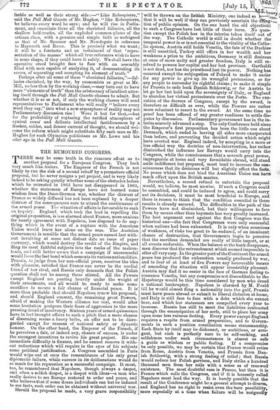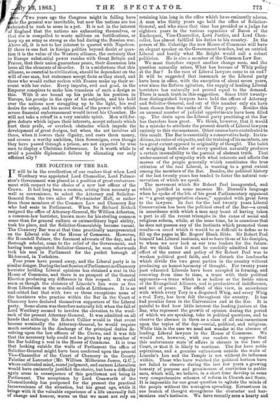THE RUMOURED CONGRESS.
THERE may be some truth in the rumours afloat as to another proposal for a European Congress. They look very much like feelers. The Emperor of the French is not likely to run the risk of a second rebuff by a premature official proposal, but he never resigns a pet project, and is very likely indeed to be asking quietly whether some of the obstacles before which he retreated in 1863 have not disappeared in 1865, whether the statesmen of Europe have not learned some wisdom from the Dano-German war, whether the distrust of France so widely diffused has not been replaced by a deeper distrust of the consequences sure to attend the continuance of the armed peace. The situation of affairs is favourable to such an inquiry. England, which took the lead in repelling the original proposition, is less alarmed about France, more anxious for hearty agreement with Napoleon, less disposed to do any- thing which in the event of a rupture with the American Union would leave her alone on the seas. The Austrian Government is sensible that the armed peace cannot last with- out involving at some not distant date an issue of paper currency, which would destroy the credit of the Empire, and fling its most faithful subjects into the ranks of the malcon- tents, and still better aware that a campaign if unsuccessful would loose the last bond which cements its various nationalities. Prussia, to judge from her non-official press, receives the idea with pleasure, satisfied that France can never be the cordial friend of her rival, and Russia only demands that the Polish question shall not be among those stirred. All the Powers except England are panting heavily under the weight of their armaments, and all would be ready to make some sacrifices to secure a fair chance of financial peace. It is' more than probable that should Napoleon renew his proposal, and should England consent, the remaining great Powers, afraid of making the Western affiance too real, would after some hesitation postpone their fears of aggression to the more pressing dread of insolvency. Sixteen years of armed quiescence have in fact brought affairs to such a pitch that a mere chance of disarming seems a heavy bribe, an offer not to be disre- garded except for reasons of national safety or dynastic honour. On the other hand, the Emperor of the French, if he perceives a fair, or indeed any, chance of success, is under the strongest incentives to revive his great project. His one immediate difficulty is finance, and he cannot remove it with- out reductions which will require in the eyes of his subjects some political justification. A. Congress assembled in Paris would wipe out at once the remembrance of his only great diplomatic failure, while success in its deliberations would do as much for his reputation as a successful campaign. It must, too, be remembered that Napoleon, though always a despot, and often a selfish despot, is a despot with ideas—a man who really desires to see Europe restored to order and peace, and who believes that if some dozen individuals can but be induced to see facts, such order can be obtained without universal war.
Should the proposal be made, a very grave responsibility heavy
will be thrown on the British Ministry, one indeed so •ree- ' that it will be well if they can previously ascertain the tion of public opinion. On the one hand the old objectioM: to such a Congress have lost little of their force. No ques-
tion except the Polish has in the interim taken itself out of the way. The Catholic world is still in doubt whether the- temporal power is or is not essential to the vitality of the Catho- lic system, Austria still holds Venetia, the fate of the Duchies is still unsettled, Turkey still offers in her wealth and her weakness a prize to the ambitious, Germany is still desirous at once of more unity and greater freedom, Italy is still re- solved to possess her capital and her lost province. Garibaldi is not dead, nor has the priesthood lost its power. Nothing has occurred except the subjugation of Poland to make it easier for any power to give up its wrongful pretensions, or for any people to surrender its rightful claims ; to make it simple- for Prussia to cede back Danish Schleswig, or for Austria to• let go her last hold upon tile sovereignty of Italy, or England to abandon her virtual protectorate over the Porte. The exe- cution of the decrees of Congress, except by the sword, is therefore as difficult as ever, while the Powers are rather more reluctant to resort to the sword. At the same time no proof has been offered of any greater readiness to settle dis- putes by discussion. Parliamentary government has in the in- terim scarcely advanced a step. The only Conference held since the Emperor's first proposition has been the little one about Denmark, which ended in leaving all sides more exasperated than before, and preventing the decided action which might have averted war. England indeed, by accepting in a more or less official way the doctrine of non-intervention, has rather
diminished the influence her Envoys would carry into the Congress, while the consciousness that a seventh great power, impregnable at home and very formidable abroad, will stand aside indifferent but prepared, must tend to increase the coo sciousness that its decisions will but slightly affect the fads. No peace which does not bind the American Union can haver much effect upon the British marine.
Nevertheless, a second refusal to entertain the proposal would, we believe, be most unwise. If such a Congress could be assembled, and could be induced to agree, and could carry out its decisions, it must be most beneficial to Europe, and there is reason to think that the condition essential to these results is already secured. The difficulties in the path of the have not diminished, but their willingness to face them by means other than bayonets has very greatly increased. The beet argument used against the first Congress was the historical one—the fact that Congresses were only successful when nations had been exhausted. It is only when conscious- of weakness, of risks too great to be endured, of an imminent chance of destruction, that Governments begin to perceive that the sacrifices demanded are really of little import, or at all eveuts endurable. When the balance at the bank disappears, men discover that the retrenchment which seemed impossible is after all very easy. In the greater part of the Continent the armed peace has produced the exhaustion usually produced by war, and to four of at least of five Powers any honourable means of amending the situation will appear irresistibly pleasant.
Austria may find it no easier in the face of German feeling to- renounce Venetia, but any compromise not discreditable to the Hapsburgs would be this time considered by men who dread a national bankruptcy. Napoleon is alarmed by M. Fould till he would almost fling a nationality into the gulf, Prussia must have peace abroad or submit to liberal dictation at home, and Italy is still face to face with a debt which she cannot bear, and which her statesmen are compelled every year to.
increase. Russia has still to meet the liabilities contracted through the emancipation of her serfs, still to place her army upon some less ruinous footing. Every power except England requires a respite from armed preparation, and to Govern- ments in such a position conciliation seems statesmanship. Each State by itself may be dishonest, or ambitions, or arro- gant, but each is perfectly sure to be self-seeking, and selfishness under such circumstances is almost as safe a guide as wisdom or public feeling. If a compromise be only possible, we may be certain that France would retire from Rome, Austria from Venetia, and Prussia from Dan- ish Schleswig, with a strong feeling of relief ; that Russia would reduce her Polish garrison, and Italy strike a hundred thousand men from her rolls with a sense as of renewed' existence. The most doubtful case is France, but then it is France.which calls the Congress, and if it is honestly called Napoleon must lead the way. It is barely possible that the result of the Conference might be a general attempt to disarm, and England has no right to resist even the bare possibility,' more especially at a time when failure will be resignedly Two years ago the Congress might in failing have de, he general war inevitable, but now the nations are too hausted to rush to arms in a pet. It is not in the interest of England that the nations are exhausting themselves, or that she is compelled to waste millions on fortifications, or keep up an army as strong as she had during the Russian war. Above all, it is not to her interest to quarrel with Napoleon. If there is one fact in foreign politics beyond doubt or ques- tion it is the value of the Western alliance, the certainty that in Europe substantial power resides with Great Britain and France, that their union guarantees peace, their dissension lets loose all the elements of disorder. It is a misfortune that this alliance, so essential to civilization, should be dependent on the will of one man, but statesmen accept facts as they stand, and those who would rather reckon with France make up their ac- count with her ruler. Every impulse, evil and good, in the Emperor conspires to make him tenacious of such a design as this. With it are bound up his pride in his position in Europe, his prestige in the eyes of his subjects, and his hold over the nations now struggling up to the light, his real desire for order, and his secret dread of the power with whioh severe financial embarrassment would invest his Chamber. He will not take a rebuff in a very amiable spirit. Men will for- give defeats which injure their interests, accept refusals which hurt their pride, or overlook obstacles which impede the development of great designs, but when the act involves all three, when it lowers their dignity, and costs them money, and crosses a worthy ambition, then Sovereigns, even though they have passed through a prison, are not expected by wise men to display a Christian forbearance. Is it worth while to avoid a possible diplomatic failure by alienating our only efficient ally ?































 Previous page
Previous page